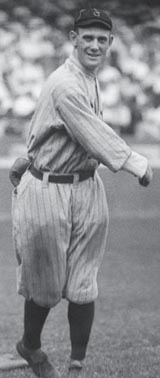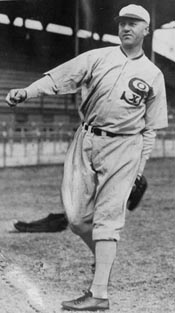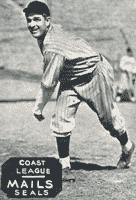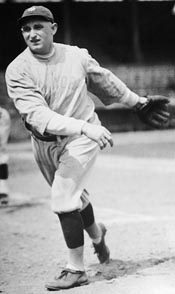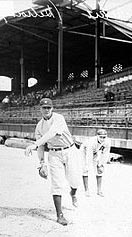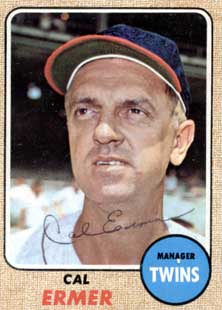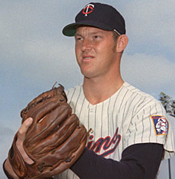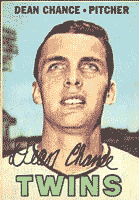Fantastic
Finishes - II
This
feature discusses the last weekend of a close pennant race in the NL or AL.
|
|
The 1920 AL pennant race was marked by three events.
- The emergence of Babe Ruth as a HR-hitter in his first season with the Yankees.
- A tragic death on the diamond.
- The collapse of a team based on what happened the year before.
On Monday, August 16, the Cleveland Indians rode the "el" on a drizzly day to the Polo Grounds to take on the New York Yankees. The Indians had lost four straight to the Yankees in Cleveland before splitting a two-game series with the St. Louis Browns. Now they were starting a road trip still in first place but with their 4 1/2 game lead reduced to percentage points over the Chicago White Sox and 1/2 game over New York.
Ray Chapman, Cleveland's popular SS, piped up: "I know why we haven't been winning. We haven't been singing." When he started singing "Dear Ol' Pal o' Mine," some teammates joined in as they had done many times during the season on trains, in hotels, and in the clubhouse.
The players remembered the incident poignantly because Chapman died early the next morning from brain damage after being beaned by Carl Mays in that afternoon's game, which Cleveland won 4-3. The Yankees postponed Tuesday afternoon's game. On Wednesday, with the stadium flags at half-mast, both teams wearing black arm bands, and Mays not on the Yankee bench, 1B Wally Pipp's inside-the-park HR in the ninth gave the home team a 4-3 victory to cut Cleveland's lead to one-half game over both the White Sox and Yankees. On Thursday, Ruth's 43rd HR wasn't enough as the visitors won 3-2 to gain a half-game on the idle White Sox.
On Friday, as the Indians attended Chapman's funeral in Cleveland, the defending AL champion White Sox swept a DH in Philadelphia over the Athletics to pull into a tie for the lead. Chicago fielded almost the same team that had lost the 1919 World Series to the Cincinnati Reds. One conspicuous absentee was 1B Chick Gandil who didn't report to spring training amid rumors that he was involved in a gambling fix in the Fall Classic. Manager "Kid" Gleason still had the best starting rotation in the majors: righties Eddie Cicotte and Red Faber, a spitballer, and southpaws Lefty Williams and Dickie Kerr.
Over the weekend, the White Sox seized a two-game lead, winning twice over the Washington Senators while the Indians dropped a DH in Boston and the Yankees lost twice to Detroit. Needing another starter, Cleveland purchased LHP Walter Mails from Sacramento.
On Monday, Carl Mays disproved AL President Ban Johnson's theory that he would never pitch again, shutting out Detroit 10-0 as Yankee fans applauded. Meanwhile, Cleveland's player-manager Tris Speaker became angry when he learned that his players had circulated a petition asking AL teams to refuse to take the field when Mays pitched. Tris was concerned that his team, victorious only five times in its last 17 games, was more concerned about Mays than the pennant race.
As August turned into September, the White Sox lost three "suspicious" games to the fifth-place Red Sox while the Indians moved back on top with three wins in Washington despite Mails' getting shelled in two innings in the finale. On the train to Cleveland after the series, the team sang for the first time since Chapman's death.
Finally playing their first home game on September 3 after their two-week road trip, the Indians paid tribute at League Park to their late SS as 15,000 fans, many in tears, stood while a bugler played taps and the U.S. flag was lowered to half-staff. The game with the Tigers was scoreless until Ty Cobb singled home the only run in the ninth off #2 starter Harry Coveleski. The Yankees pulled into a virtual tie for first with Cleveland.
Over the Labor Day weekend, the Indians swept a DH over the Browns before an overflow crowd of 23,000. Mails pitched the 7-2 triumph in the opener before a two-run rally in the bottom of the ninth claimed the nightcap. Unfortunately, Harry Lunte, who had been manning SS, pulled a thigh muscle. So Speaker purchased 21-year-old Joe Sewell, only 5'6", from New Orleans of the Southern Association. Only four months removed from college ball at Alabama, Joe already had a reputation for rarely striking out. He arrived in Cleveland in time for the biggest series of the year, a three-game set with the Yankees, who decided not to take Mays to Cleveland "out of respect to the feeling of the people there."
Reference: Pennant Races: Baseball at Its Best,
Dave Anderson
|
Wally Pipp
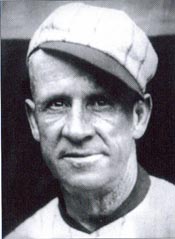
"Kid" Gleason
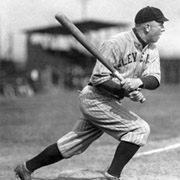
Tris Speaker
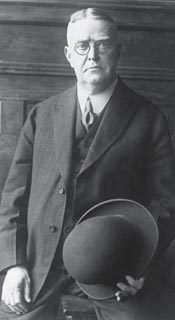
Ban Johnson
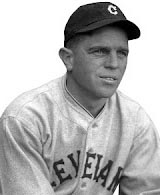
Joe Sewell
|
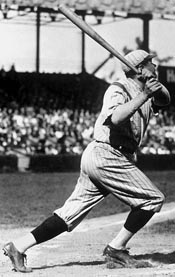
Babe Ruth
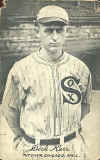
Dickie Kerr
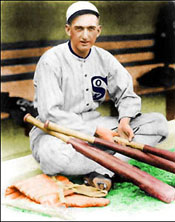
Joe Jackson
|
On September 9, 1920, the AL standings looked like this.
Team |
W |
L |
% |
GB |
| Cleveland Indians |
82 |
49 |
.626 |
- |
| Chicago White Sox |
83 |
52 |
.615 |
1 |
| New York Yankees |
83 |
53 |
.610 |
1.5 |
That day the Yankees opened a crucial three-game series in Cleveland.
- Babe Ruth got the visitors off to a fast start with his 47th HR, a two-run shot, in the first inning. He would hit no more that day, as Harry Coveleski walked him intentionally three times while pitching a six-hitter as the Indians won 10-4.
- However, New York won the next two. Ruth's 48th sparked Bob Shawkey's 6-1 win, and Babe's two doubles contributed to a 6-2 victory that put the Yanks in first place by a half game with Cleveland in a virtual tie with the Sox, who won two of three from the Red Sox.
The Yankees continued their western swing in Detroit, where Carl Mays rejoined them to win the middle game of the three-game sweep. Cleveland won three of four from the last-place Philadelphia Athletics, but the White Sox lost two of three to Washington Senators. So New York now led by a game.
The Yankees moved to Chicago for another pressure-packed series.
- Little lefty Dickie Kerr, the bright spot for the White Sox with two victories in the 1919 World Series, won the opener 8-3. Meanwhile, the Indians got a shutout from recent purchase Walter Mails over the Senators 1-0 to tie NY for first with the White Sox one-and-a-half behind.
- The White Sox took the second game also, 6-4 behind Red Faber who was supported by consecutive first-inning triples by Eddie Collins, Joe Jackson, and Happy Felsch.
- Chicago completed the sweep, routing Shawkey 15-9. The Yanks limped out of the Windy City two behind and never regained the lead.
- The Indians swept Washington despite three errors in one inning by Joe Sewell, the rookie replacement for the dearly departed Ray Chapman, to retain their 1.5 game lead over the Sox.
The eastern teams finished their western swings.
- Cleveland swept Boston to run their winning streak to seven in a row.
- Chicago ran its own streak to six by sweeping the A's.
- New York took two of three from the St. Louis Browns to complete their road trip at 7-5.
The standings after the games of September 21 looked like this with one week to go.
Team |
W |
L |
% |
GB |
| Cleveland Indians |
91 |
52 |
.636 |
- |
| Chicago White Sox |
91 |
55 |
.623 |
1.5 |
| New York Yankees |
90 |
57 |
.612 |
3 |
Meanwhile, events off the field of play were about to have a tremendous effect on the pennant race, devastating one club because of what took place nearly a year earlier.
Reference: Pennant Races: Baseball at Its Best: Dave Anderson
To be continued ... |
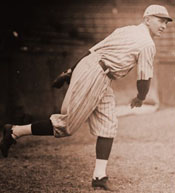
Bob Shawkey
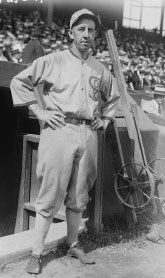
Eddie Collins
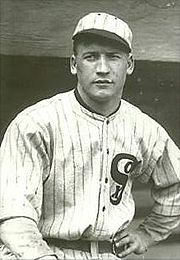
Happy Felsch |
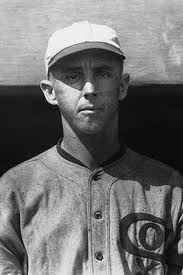
Lefty Williams
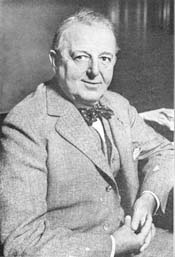
Charles Comiskey
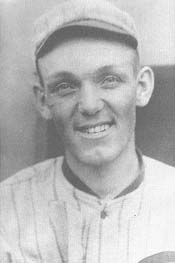
Buck Weaver
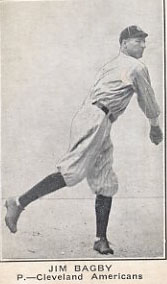
|
Heavy betting on an insignificant game on August 31 between the Cubs and Phillies led to the convening of a grand jury in Chicago to investigate baseball gambling in general and, in particular, whether the 1919 World Series had been fixed.
- Furthermore, AL President Ban Johnson stated that he had received reports that some members of the White Sox would make sure the team didn't win the 1920 pennant because the gamblers who controlled them had forbidden it.
- Such actions and reports started a feeding frenzy on the part of the press, who rehashed all the stories that had circulated following the previous Fall Classic and rushed to scoop everyone with evidence of a fix.
Amid all the furor, the White Sox traveled to Cleveland for a crucial three-game series.
- Chicago won the opener 10-3 behind Dickie Kerr to pull within a half-game of the lead.
- However, rookie "Great" Mails, called up by the Indians in mid-August, shut out the White Sox 2-0 to restore the 1.5 game lead. One writer claimed that Chicago could not help but be affected by what was happening back home. "It has made those who are not under suspicion mad, but overanxious" with the result that they botched routine plays.
- The Chicago Tribune the next day trumpeted a front-page headline about its story on the "Inside Story of Plot to Buy" the 1919 World Series. Nevertheless, Lefty Williams, one of the players often mentioned in "fix" stories, beat Cleveland 5-1 that afternoon to restore the margin to 1/2 game. Joe Jackson had a HR and two doubles. The White Sox were not playing like a team trying to blow the pennant.
- Meanwhile the Yankees split four games with the Senators to remain three off the pace.
Normally, a team looks forward to playing at home. In the White Sox's case, however, they returned to a hornets' nest to play two games against Detroit. The Sunday Tribune blared, "First Evidence of Money Paid to Sox Bared."
- Nevertheless, Eddie Cicotte, another P at the heart of the conspiracy, threw a seven-hitter to beat the Tigers, 8-1. However, Cleveland maintained its half-game lead as Joe Sewell drove in four runs in a 7-5 win over the Browns.
- After the White Sox game, owner Charles Comiskey confessed that he had been suspicious of a fix ever since his club lost the first game of the 1919 World Series. Monday the Philadelphia North American published a story under the headline, "The Most Gigantic Sports Swindles in the History of America." Billy Maharg, a former ML player, admitted that he and Sleepy Bill Burns had begun the conspiracy to throw the 1919 Series.
- Chicago defeated Detroit again behind the six-hit pitching of Kerr, 2-0. Then they read the Chicago afternoon papers, which repeated the story from Philly. In St. Louis, the Indians won again, 8-4, behind Mails.
The White Sox now had three days off before finishing with three games in St. Louis. This quirk in the schedule accelerated the Grand Jury investigation into what had happened the previous October.
- On the first off day, Cicotte, at manager Gleason's urging, met with Comiskey to tell him how he "double-crossed him" in the '19 Series. The owner cut him off and told him to tell his story to the grand jury.
- Before the day was over, Cicotte confessed to the Grand Jury, naming the others involved. He included specific ways that he contributed to losses during the Series.
- Over the next two days, the other conspirators appeared before the Grand Jury, some talking like Cicotte, others keeping mum. Eight were indicted: Cicotte, Jackson, Williams, Happy Felsch, Chick Gandil (no longer on the team), Buck Weaver, Fred McMullin, and Swede Risberg.
- By the time the White Sox left for St. Louis, Comiskey indefinitely suspended all the indicted players.
On the Sox's first two off days, Cleveland defeated the Browns 9-5 and 10-2. The Indians then entrained for Detroit 1.5 in front to finish with four games against the Tigers.
-
Playing without three .300+ hitters, the White Sox lost 8-6 to theBrowns. Cleveland lost the opener but won the nightcap, 10-2. Two ahead with two to play, the Indians had clinched a tie for the pennant.
- Chicago won the next day, 10-7, but didn't get help in Detroit. Jim Bagby's 31st victory, 10-1, gave Cleveland its first AL championship.
- The Yankees swept Philadelphia but still finished third behind the White Sox.
Cleveland defeated the Brooklyn Robins five games to two to take the best-of-nine World Series.
Reference: Pennant Races: Baseball at Its Best: Dave Anderson
|
This feature discusses the last week of a close pennant race in the NL or AL.
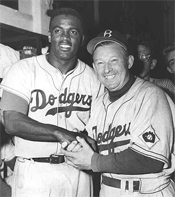
Jackie Robinson and Charlie Dressen
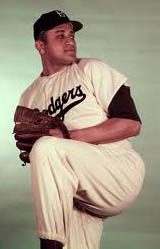
Don Newcombe
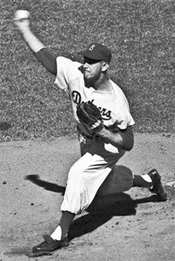
Clem Labine
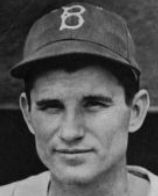
Preacher Roe
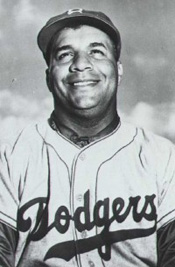
Roy Campanella
|
After winning the first game of a DH on Saturday, August 11, 1951, the Brooklyn Dodgers led the 2nd-place New York Giants by 13.5 games. In the previous series, Charlie Dressen's Dodgers had swept the Giants in three games at Ebbets Field. The following week the Giants returned the favor at the Polo Grounds. Still, Leo Durocher's club was 9.5 back with 36 left.
By the time the teams met again on the weekend of September 1-2, the Giants were 7 behind. After an 8-1 win behind Sal Maglie and and Jim Hearn's 11-2 triumph, Leo's boys had whittled the lead to 5. When the rivals met again at Brooklyn the following weekend, Don Newcombe shutout New York 9-0 to temporarily push the lead to 6.5. But a crucial 2-1 win on Sunday put the Giants back to 5.5 behind.
Since the teams had completed their 22-game schedule against each other, with Brooklyn winning the season series 13-9, the Giants had to win as many as they could and rely on other teams for help. As it turned out, they also got some help from Dressen himself.
Both teams headed west to the play St. Louis, Chicago, Cincinnati, and Pittsburgh. The Giants finished the trip 6-3 while the Dodgers went 5-4. The lead was down to 4.5.
The teams finished up against the eastern teams. (The league was not subdivided in the standings, but the schedule divided the eight teams into two groups to minimize travel.) Starting the final week of the season, the Giants defeated the Braves in Boston 4-3 to reduce the deficit to 2.5. New York then started a two-game set at Philadelphia while Brooklyn played four at Boston.
Tuesday, Sept. 25
New York won the opener over the Phillies 5-1 for Hearn's 16th.
Brooklyn lost a DH, 6-3 and 14-2. The lead was trimmed to one.
"It couldn't happen to a nicer bunch of guys," said Durocher, still steaming from his dismissal by the Dodgers in 1948.
Wednesday, Sept. 26
The Giants coasted 10-1 behind Larry Jansen.
Brooklyn romped also, 15-5. However, with a 13-3 lead in the 8th, Jackie Robinson stole home. Several Braves told the Dodgers after the game, "Stealing home in that situation is bush baseball. We'll get you bastards tomorrow."
Thursday, Sept. 27
With the Giants idle, Boston did indeed get the bastards, 4-3. The Dodgers rotation called for rookie Clem Labine to start. Called up at mid-season, he had won 4 of 5 down the stretch. However, the loss had put him in Dressen's doghouse. On September 21, the Phillies loaded the bases in the first. Labine then set up in stretch position, bringing Charlie hurriedly to the mound. Although Clem said he could throw his curve better from the stretch, Dressen told him to use his full windup. Labine ignored the order and surrendered a grand slam on his first pitch to start a 9-6 loss. Now Dressen switched to Preacher Roe on three days rest. Roe was enjoying an incredible 22-2 year. But the Braves beat him in a game that featured a monumental blowup in the eighth. With the game tied 3-3, Boston had runners on first and third with none out. With the IF in, Earl Torgeson bounced to 2B Robinson who threw to C Roy Campanella, who had the plate blocked. Campy thought he tagged the runner in time – as did most observers in the pressbox – but Frank Dascoli signaled safe. Roy threw his glove into the dirt and confronted Dascoli, who ejected him. Other Dodgers surrounded the ump, who also ousted coach Cookie Lavagetto, his only ejection in all his years in baseball. Dascoli then cleared the Brooklyn bench, ordering all extra players to stay in the clubhouse unless they were needed in the game. |
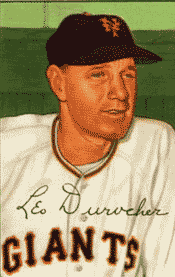
Leo Durocher
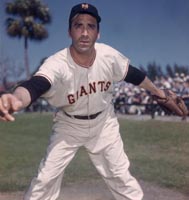
Sal Maglie
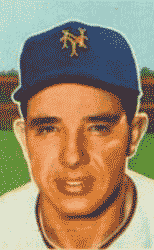
Jim Hearn
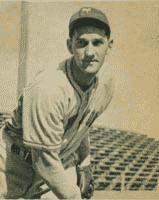
Larry Jansen
|
In his autobiography, Campanella recalled the nasty incident. What happened on the field was mild compared to what took place in the runway outside the umpires' dressing room, after the last out. The umpires' door in Braves Field was right next to the visiting team's clubhouse. As the Dodger players went by, they banged and kicked that door, shouting names you don't hear in no church. Preacher Roe, still fuming over the defeat, kicked at the door. So did Jackie and one or two others. The next thing I knew someone had kicked the panel out of the door. Of course, we didn't get away with it. ... The upshot was that Jackie and I were fined $100 apiece and Preach got smacked for fifty bucks.
Brooklyn led by a half game going into the final weekend.
Continue below.
Reference: Pennant Races: Baseball at Its Best: Dave Anderson
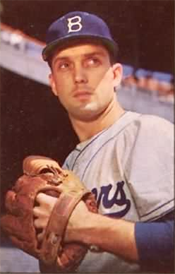
Carl Erskine
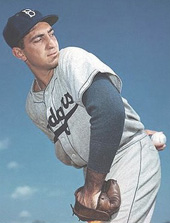
Ralph Branca
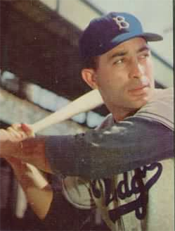
Carl Furillo
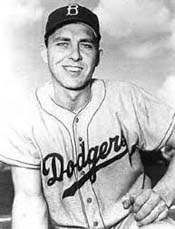
Gil Hodges
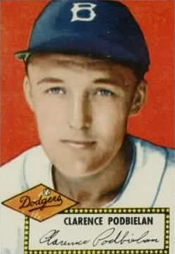
|
Entering the final weekend of the 1951 series, the Brooklyn Dodgers led the New York Giants by a half game. Both teams would finish on the road, the Dodgers with three at Philly and the Giants with two at Boston. Durocher was confident. "If we win our two in Boston, and we will, the Dodgers must win their three in Philadelphia to clinch it. I don't think they can do it. They're screaming at the umpires. Pretty soon they'll be screaming at each other. Pennant pressure can give the steadiest of pros the yips. Look at the won-lost percentage for the last thirty days. That tells the story. We're the solid club."
Friday, September 28
With the Giants idle, the Dodgers would either go up one or fall into a tie, their entire 13.5 lead from August dissipated. C Roy Campanella clouted his 33rd HR to stake RHP Carl Erskine to a 3-0 lead. But the Phils tied it in the eighth on C Andy Seminick's two-run HR and won it in the ninth. Brooklyn and New York had identical 94-58 records with two games left.
Saturday, September 29
In the afternoon, Sal Maglie outpitched Warren Spahn 3-0 for his 23rd victory in Boston. This put the Giants in first place, albeit by only one-half game and pending the results of the night game in Philadelphia, for the first time all season.
That night the Dodgers also got a shutout from their starter, Don Newcombe, who outdueled the Phillies' ace, Robin Roberts, 5-0, to restore the tie with one game left.
Sunday, September 30
Both teams played simultaneously. So scoreboard watching was in vogue at both Braves Field and Shibe Park. In Beantown, the Braves took a 1-0 lead but 3B Bobby Thomson hit his 30th HR to tie it in the second. P Larry Jansen, 2B Eddie Stanky, and RF Don Mueller singled in the third to make it 2-1 Giants. In the fifth, LF Monty Irvin drove in SS Al Dark to add to the lead. The scoreboard showed the Dodgers losing 6-1. Durocher told his team, "Forget the scoreboad. Just win our game." Boston rallied in the ninth but fell 3-2 with the tying and winning runs on base. It was 3:35 and the Dodgers were losing 8-5. The Giants dressed quickly and boarded their train to Grand Central Station with six cases of champagne on board and a telephone hookup with a New York radio station for the Dodger play-by-play of what turned into one of the most dramatic games in baseball history.
- Still refusing to start Labine, Dressen went with Roe, this time with two days rest. "I guess I didn't have anything," Preacher admitted after he was removed in the 2nd. Dressen brought in Ralph Branca, who had started but thrown only 17 pitches in the first game at Boston on Tuesday. He gave up two runs, then gave way to others, including Labine, pitching for the first time in nine days. Finally, Erskine shut down the Phillies in the sixth and seventh to give his team a chance to come back.
- Which is what they did. Rube Walker, pinch-hitting for Erskine, doubled in two in the eighth to make it 8-7. Philadelphia manager Eddie Sawyer, making the league proud by pulling out all stops even though the game wouldn't change his team's fifth-place finish, brought in Roberts. But RF Carl Furillo singled in the tying run. Dressen countered with Newcombe in the bottom of the eighth to set up Newcombe vs. Roberts for the second time in 16 hours.
- The game remained tied into the bottom of the twelfth. Newcombe, who had pitched a complete game Friday night on two days rest, was now laboring with one day off. He walked Roberts to open the inning. When the next batter bunted, Newk tried for second but threw wide. CF Richie Ashburn also bunted, but 1B Gil Hodges got the forceout at second. However, the winning run moved to third. Dressen ordered an intentional walk for 3B Puddin' Head Jones to create a force at every base. Next up was LF Del Ennis, a right-handed power hitter who could lift a sac fly. Newcombe pitched him superbly and struck him out. 1B Eddie Waitkus slashed a low liner up the middle. 2B Robinson dove to his right and snared it backhanded, skidding through the dirt face first. He knocked the wind out of himself but soon arose and struggled to the dugout. Brooklyn lived to fight another inning.
- In the 14th, Roberts got the first two outs with ease. Then Robinson clouted a fastball into the upper deck in LF. Asked afterwards if he was aiming for the stands, Jackie replied, "I sure was." Dressen had finally removed Newcombe in the bottom of the 13th with two on for his seventh P, Bud Podbielan, who got the final out. However, Ashburn greeted him in the bottom of the 14th with a single, and Jones bunted Richie to second. But Ennis popped out, and Waitkus flied out. The Dodgers had come back from 6-1 to win 9-8.
The Giants had finished 37-7 while the Dodgers went 26-22. Under NL rules, the teams would play a best-of-three playoff for the right to meet the New York Yankees in the World Series. After going until 1946 without either league needing a playoff, the NL now staged its second one in six years. And the AL had a one-game playoff in 1948.
Reference: Pennant Races: Baseball at Its Best: Dave Anderson
|
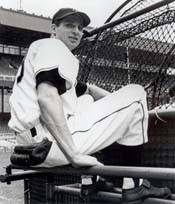
Bobby Thomson
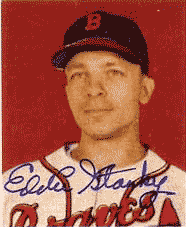
Eddie Stanky
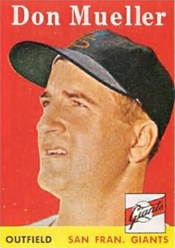
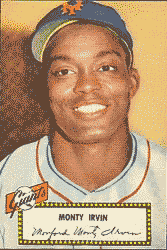
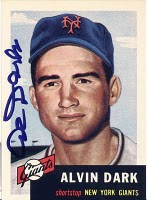
Alvin Dark
|
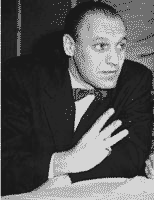
Buzzy Bavasi
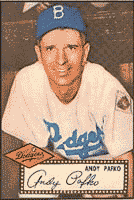
Andy Pafko
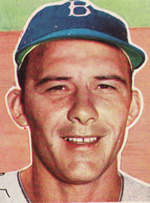
Rube Walker
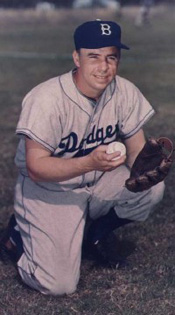
PeeWee Reese
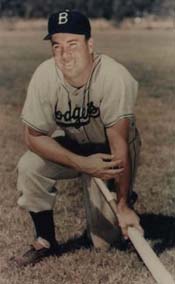
Duke Snider
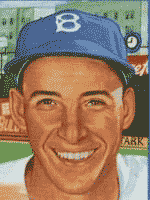
Billy Cox
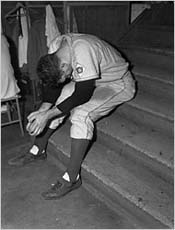
Dejected Ralph Branca
on the clubhouse steps
|
On the last Thursday morning of the regular season, the NL office conducted the coin flip to determine home field for the possible three-game playoff. The winner could choose to be home for the first game or for the second two. Giants owner Horace Stoneham, present at the league office in New York, called "heads" but the coin came up tails. Charlie Dressen, connected by phone from his hotel in Boston with GM Buzzy Bavasi, immediately chose, "First game in Brooklyn." Dressen explained to the flabbergasted Bavasi that he remembered the 1946 playoff between the Dodgers and Cardinals. Winning the flip, Leo Durocher, then managing Brooklyn, chose to start in St. Louis. But the Cardinals won the first two games. In Dressen's view, the first game was the key. "That's the one you want at home."
Game One: Monday, October 1 at Ebbets Field
On a warm, hazy afternoon, Ralph Branca (13-11) of the Dodgers faced Jim Hearn (16-9) of the Giants. LF Andy Pafko's homer in the second gave the home team a 1-0 lead. However, in the fourth, Branca hit Monte Irvin and, in a taste of things to come, Bobby Thomson smashed a fastball in the LCF stands. In the eighth, Irvin did the same for a 3-1 victory that immediately screwed up Dressen's plan.
Game Two: Tuesday, October 2 at the Polo Grounds
Dressen started Rube Walker behind the plate. Roy Campanella had pulled a hamstring on Sunday in Philadelphia while running out a triple. With his right thigh taped tightly, he had gutted out 14 innings. His immobility had cost the Dodgers in Game One. He had not backed up throws to 1B and ignored foul pops not near home plate. When he came up in the fourth with a men on first and third and one out, Durocher had played his IF on the OF grass. Campy hit a grounder to SS Dark who threw to Stanky for one out. However, the throw to first was wide, but Whitey Lockman was able to leave the bag to catch it and then tag the lumbering batter. So Roy's injury cost Brooklyn a run. The other surprise was that rookie RHP Clem Labine came out of Dressen's doghouse to pitch a 10-0 blowout. Instead of pitching Sal Maglie on only two days rest, Durocher went with Sheldon Jones as a sort of sacrificial lamb.
Game Three: Wednesday, October 3 at the Polo Grounds
Both teams knew it was a colossal game, but they and the 34,320 fans (in a 55,000-seat stadium) had no idea they were about to experience arguably the most famous game in baseball history. Dressen went with Don Newcombe (20-9) with two days rest after his six-inning relief stint Sunday. Charlie also kept Walker behind the plate. Durocher chose Sal Maglie (23-6), who hadn't pitched since Saturday and had beaten Brooklyn five times during the season.
- The Barber started shakily, allowing a run in the top of the first. The Giants missed a chance to tie in the second when Thomson extended his hitting streak to 15 games with a line drive down the LF line with Lockman on first. However, Pafko fielded the ball quickly and held Whitey at 2B. But Thomson, figuring he had a sure double, rounded first and chugged to second only to spot Lockman on the bag. The Dodgers tagged the Scotsman before he could retreat to first. On an overcast day, the lights were turned on in the third inning. "Maybe Thomson can see Lockman on second now," someone joked in the press box. "Maybe they can see Newcombe's fastball," someone else offered.
- Newk extended his scoreless inning streak to 23 2/3 before the Giants scored in the seventh. Irvin doubled. Lockman bunted but Walker threw too late to third. (Would Campy have made the play?) Thomson then hit a SF.
- The tie didn't last long. In the eighth, SS Pee Wee Reese and CF Duke Snider singled to put runners on first and third. A wild pitch scored Reese. Durocher then ordered Robinson walked. But Pafko singled to score Snider. After Hodges popped out, 3B Billy Cox singled in another run for a commanding 4-1 lead. Durocher remained confident. He was certain that Newcombe would falter. But Big Don didn't show any signs of weakness when he retired the Giants in order in the eighth.
- After Larry Jansen set down the Bums 1-2-3 in the ninth, Durocher paused before going to the 3B coaching box to greet his players. "You guys have come this far. Let's give 'em a finish." In the Dodger bullpen, Branca and Erskine had been throwing since the fifth. Branca, bothered by a sore shoulder the last month, was loose if needed. In today's baseball, the Dodgers closer would have pitched the ninth, but the concept did not exist in 1951. Instead, Newcombe tried to coax one more inning out of his weary arm.
- Dark led off with a two-strike seeing-eye grounder between Hodges and Robinson. With a three-run lead, Dressen surprisingly motioned Hodges to hold Dark close despite the fact that a left-handed hitter, Don Mueller, was next. Sure enough, Mueller ripped a fastball through the gap to send Dark to third. Irvin, perhaps trying too hard to pull one out, popped out to first. In the press box, an announcement was made: "World Series credentials for Ebbets Field can be picked up at six o'clock tonight at the Biltmore Hotel."
- Whitey Lockman stood in hoping to hit a tying HR. Newcombe kept it away, but Whitey whacked it into the LF corner for a double to make it 4-2. Running to third, Mueller had stumbled over the bag while looking at the ball and went down with a bone in his foot. The game stopped while he was attended to. In the meantime, Dressen went to the mound. He startled his battery and IF by asking, "What do you want to do? It's your money as well as mine." Captain Reese suggested it was time for a fresh arm.
- Dressen had called the bulllpen to ask who looked better, Branca or Erskine. Coach Clyde Sukeforth recommended Branca who thought, "I could be a hero." His arm felt strong despite lots of recent work. Meanwhile, the next hitter, Thomson, walked to 3B to comfort Mueller. Durocher told Bobby, "If you ever hit one, hit one now." On deck, rookie CF Willie Mays assumed an intentional walk to bring him up with the bases loaded.
- Branca remembered the HR Thomson hit Monday off a fastball. But to set up the curve, he fired one across the middle of the plate. NY fans and players groaned, thinking Bobby wouldn't get a better pitch to hit. Then Branca made the mistake that has haunted him ever since. He decided to waste a fastball up and in before throwing a curve on the outside corner. Not wanting to take another strike, Thomson drove a liner to LF. Was it high enough to clear the wall? Pafko thought he might catch it or at least hold it to a single.
- Meanwhile, in Chicago, where Pafko had lived before being traded to the Dodgers, his wife watched on TV. A few minutes earlier, a cab had arrived to take her to the airport for her flight to New York for the World Series. She asked him to wait a few minutes. "The game's almost over."
- When Thomson's liner make it into the bleachers. Giants' radio announcer Russ Hodges yelled four times, "The Giants win the pennant!" Teary-eyed, Ellen Pafko told the cabbie she didn't need him.
Video of Thomson's HR with Russ Hodges' Call
|
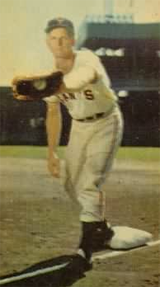
Whitey Lockman
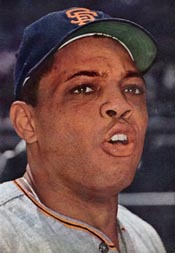
Willie Mays
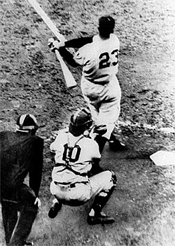
Bobby Thomson hits the
"Shot Heard 'Round the World"
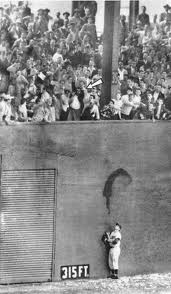
Pafko watches helplessly
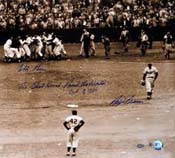
Giants celebrate while Branca
walks to the clubhouse and
Robinson makes sure Thomson
touches
every base
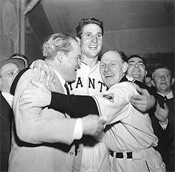
Horace Stoneham, Bobby
Thomson, Leo Durocher
|
- In the clubhouse, someone from the Perry Como TV show offered Thomson $500 to appear that night. Bobby said he wanted to see his mother and sisters, who hadn't come to the game. When the rep doubled his offer, the thrifty Scot decided his family could wait.
- In the parking lot, Branca met his fiancee Ann and their friend, a Jesuit priest. "Why me, father?" asked Ralph. "God chose you, Ralph, because He knew you'd be strong enough to bear this cross."
The Series against the Yankees was somewhat anti-climactic. Showing no signs of fatigue, the Giants won the first and third games before losing in six.
References: Pennant Races: Baseball at Its Best: Dave Anderson
It's Good to Be Alive, Roy Campanella (1959)
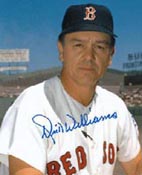
Dick Williams
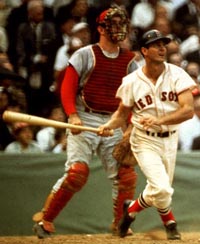
Carl Yastrzemzki
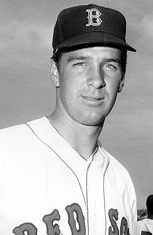
Jim Lonborg
|
ESPN.com's Rob Neyer calls it "the best four-team race in major league history." The combatants were:
- Detroit Tigers, the pre-season favorites, led by Manager Mayo Smith;
- Minnesota Twins, the 1965 AL champs who played much better after manager Sam Mele was fired in favor of Cal Ermer after starting 25-25;
- Boston Red Sox, whose new manager, Dick Williams, jump started a team that finished ninth in 1966;
- Chicago White Sox of Eddie Stanky, a replica of the Hitless Wonders of 1906 with a team batting average of .225 for the entire season but with a 2.45 ERA that led the junior circuit.
The closeness of the race is exemplified by these facts.
- July 12: The White Sox lead the Red Sox by a half game with the Tigers and Twins only two behind the leader.
- August 22: All four clubs are bunched within one game of each other.
- September 6: A four-way tie!
- September 18: Minnesota, Detroit, and Boston are 85-66. Chicago is 85-67.
The White Sox finally falter on the last Wednesday of the season when they lose a doubleheader to the last place Athletics playing their last season in Kansas City. Stanky's crew is the first to be eliminated on Friday when they lose (fittingly) 1-0 to Gil Hodges' 6th-place Washington Senators. The doubleheader in Detroit with the California Angels is rained out, forcing DHs the next two days.
So heading into the last Saturday of the season, the standings look like this.
| Team |
W |
L |
GB |
Final series (#games) |
| Minnesota |
91 |
69 |
– |
@Boston (2) |
| Boston |
90 |
70 |
1.0 |
Minnesota (2) |
| Detroit |
89 |
69 |
1.0 |
California (4) |
Saturday,
September 30
- The Tigers split with the Angels, 5-0 and 6-8.
- At Fenway, the Twin relievers falter after starter Jim Kaat is forced off the mound with an injury. Boston wins 6-4.
- Result: Boston and Minnesota are tied for first at 91-70 with Detroit a half-game behind at 90-70.
Sunday,
October 1
- Detroit bests California in the first game, 6-4.
- Jim Lonborg outduels Dean Chance for his 22nd victory, 5-3.
- With a chance to tie Boston for first, Detroit loses the nightcap 8-5.
- Result: Boston wins the pennant by one game over both the Twins and Tigers.
An arguably mediocre Red Sox team was carried to the World Series for the first time in 21 years by Lonborg and LF Carl Yastrzemzki, who won the Triple Crown with a .326 average, 121 RBI, and 44 HR (which tied Harmon Killibrew of the Twins). Yaz also led the AL in on-base %, slugging % (and therefore OPS, which wasn't kept at the time), hits, total bases, and runs created (R + RBI – HR).
Boston met the same team it had faced in 1946, the St. Louis Cardinals. The result was also the same: a Card victory in seven games as Bob Gibson won three. |
|
|
FANTASTIC FINISHES ON THIS PAGE
American
League
AL
1920 – 1
AL
1920 – 2
AL
1920 – 3
AL
1967
National
League
NL
1951 – 1
NL
1951 – 2
NL
1951 – 3
Fantastic Finishes - I
Fantastic Finishes - III
Fantastic Finishes - IV
Baseball
Magazine
Golden Rankings Home
Top of Page |









